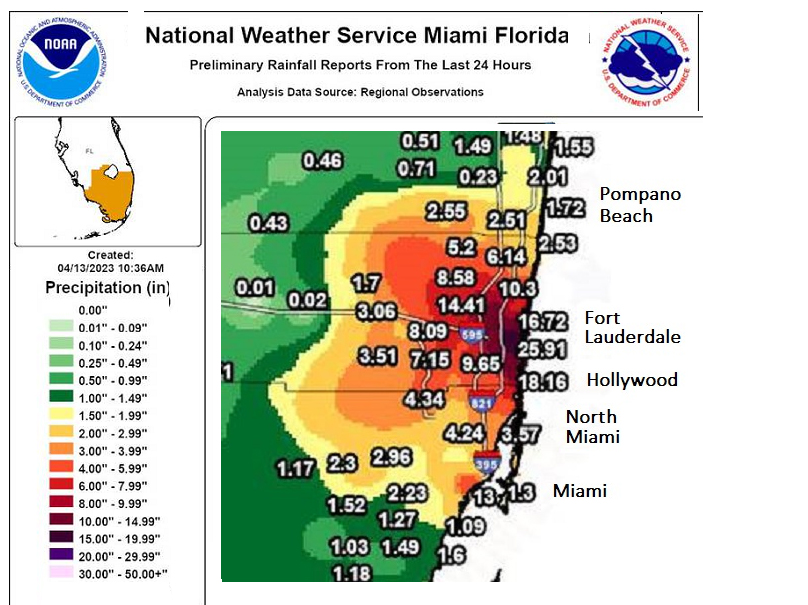By John C. Capece, Kissimmee Waterkeeper
All long-term water issues outcomes are completely dependent on climate outcomes, but few really understand this hard fact. The Fort Lauderdale deluges provide more evidence of this reality.

Many newscasts are inadvertently misrepresenting the record-breaking rainfall in Fort Lauderdale. They are calling it a 1,000-year event. That may have been true decades ago, but we hydrologists and engineers have known that climate change rendered those statistics obsolete more than 20 years ago.
We had been calling for the government to revise the statistics to take climate change into account. Last year, they finally revised the numbers.
I checked the IDF (intensity-duration-frequency) curves and verified that a 26-inch rainfall in one day traditionally corresponded to a 1,000-year event. This means that such a storm could be expected once in a thousand years – statistically speaking, that is.
Another key factor is that this rain happened in April, a typically low-rainfall month. Thus, if the seasonality were figured into the analysis, the rainfall could have been far beyond a 1,000-year event.
But 1,000-years is a sufficiently dramatic statistic to digest. Obviously, climate change has dramatically altered our rainfall patterns.

Just last year government agencies finally modified the IDF curve methodology to add a “change factor” to the IDF methodology for estimating the frequency of extreme rainfall event. For Broward County, the appropriate change factor is approximately 1.6.
Applying this adjustment to the IDF curves yields a new recurrence interval of approximately 100 years. Thus, a few years ago, Wednesday’s 26-inch storm in Fort Lauderdale would have been considered a 1,000-year event, but today it is simply more like a 100-year event.
My estimates of the modifications are something of a simplification/approximation of the more exact statistics, but they are sufficient for demonstrating the scale of change in the natural system through which we are living.

Furthermore, the fact that such an extreme event has happened and is now part of the historical data set means that the statistics could change further due to what statisticians call “non-stationary” processes. As a result, 100 years could be too conservative an estimate. Such storms may become even more frequent as climate change accelerates.
These developments are absolutely shocking and should refocus everyone on the overarching importance of taking action to reduce climate change by eliminating greenhouse-gas emissions. Abrupt climate change is altering the world at an alarming pace. Its deadly effects will steadily grow in intensity, particularly in coastal Florida.
John C. Capece, Ph.D., is Kissimmee Waterkeeper. This piece was originally published on the Kissimmee Waterkeeper Facebook page.
If you are interested in submitting an opinion piece to The Invading Sea, email Editor Nathan Crabbe at ncrabbe@fau.edu.



